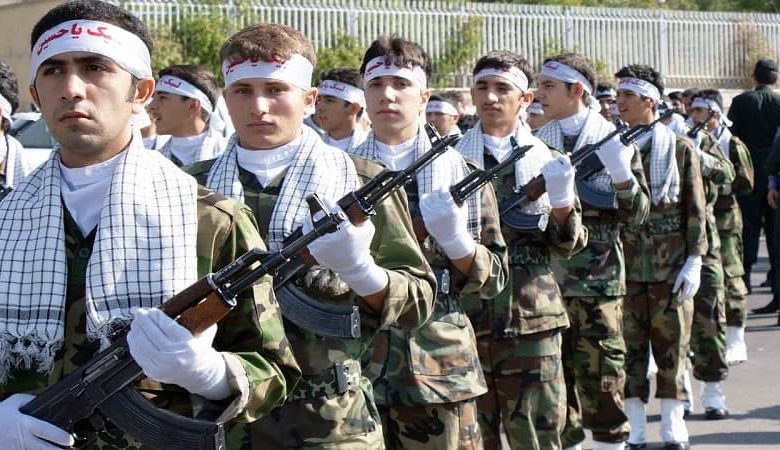Officials Bolstering Basij Forces Ahead of Iran Uprising Anniversary

Written by
Mehdi Oghbai
Basij forces (The Organization for Mobilization of the Oppressed), a paramilitary volunteer militia
In the past few weeks, the frequency of meetings between Iranian state leaders with military personnel, particularly the Basij forces, has been noteworthy. Alongside the news and media reports that were published, an examination of the website Basij.ir reveals significant outcomes in this regard.
The reason should not be attributed to the intense empathy of the system’s leadership in those who have grown increasingly disgruntled but rather in the first anniversary of the uprising that began with the death of Mahsa Amini on September 16 and continues to shake the regime until today.
In a meeting with Basij commanders on August 8, Hassan Hassan-Zadeh, the commander of the Islamic Revolutionary Guard Corps (IRGC) responsible for Tehran Province, expressed concerns while emphasizing the significance of the regime’s paramilitary forces. He remarked, “If it weren’t for our emphasis on neighborhood-based security last year, the enemy’s endeavors in Tehran would not have been thwarted. We need to establish strong foundations, and this doesn’t solely involve missile construction.”
On August 10, Hamid Khodamdel , the IRGC commander in Kohgiluyeh and Boyer-Ahmad Province, articulated during a speech to a gathering of regime forces, “The current battle is one of determination and principles… The manifestation of this conflict extends beyond mere missiles, cannons, and tanks. Although the adversary remains unchanged, the instruments and arena of warfare have now reached our very homes.”
These statements mirror the profound apprehension and unease among state officials regarding the grassroots momentum that poses a direct challenge to the security and survival of the clerical regime. The regime’s nuclear and missile production capabilities are ill-equipped to counter this internal challenge. In fact, the Supreme Leader Ali Khamenei recognizes that effectively addressing this concern demands the mobilization of Basij forces within the neighborhoods, streets, and alleys of Iranian cities.
The Basij force was established with the primary intention of securing the regime’s hold on power and suppressing dissent. This paramilitary organization, formed during the Iran-Iraq war, has since become a critical instrument for the state to enforce ideological conformity and maintain control over the population.
#IranProtests2022: Brutal suppression of the protesters by the regime’s Revolutionary Guards (IRGC), paramilitary Basij, State Security Forces (SSF), and plainclothes agents. #Iran #MahsaAmini #IranRevolution pic.twitter.com/N2tHsCM3nF
— NCRI-FAC (@iran_policy) September 28, 2022
#IRANPROTESTS2022: BRUTAL SUPPRESSION OF THE PROTESTERS BY THE REGIME’S REVOLUTIONARY GUARDS (IRGC), PARAMILITARY BASIJ, STATE SECURITY FORCES (SSF), AND PLAINCLOTHES AGENTS. #IRAN #MAHSAAMINI #IRANREVOLUTION PIC.TWITTER.COM/N2THSCM3NF
— NCRI-FAC (@IRAN_POLICY) SEPTEMBER 28, 2022
On the surface, the Basij, often referred to as the “mobilization” force, comprises fervent loyalists who are indoctrinated with the regime’s principles and tasked with promoting its ideology at the grassroots level. However, the reality contrasts with this.
Exploiting widespread poverty in Iran, the regime strategically leverages economic incentives to encourage people’s enlistment in the Basij, thereby playing people against each other to remain in control.
With a strong presence in neighborhoods, universities, and workplaces, the Basij acts as an extension of the regime’s security apparatus, quelling protests, conducting surveillance, and responding swiftly to any perceived threats to the regime’s authority.
The statements made by Hossein Salami, the Commander-in-Chief of the IRGC, during a meeting with Basij base commanders, starkly underscore the imminent peril confronting the regime’s security and continuation. On August 1, he emphasized, “Stay vigilant regarding your local Basij bases! Enhance the Islamic neighborhoods! Breathe life into the stations, and ensure the vitality of your headquarters.”
In the same address, Salami expressed concerns regarding the susceptibility and fragility of the regime’s security forces in the face of this internal threat, cautioning, “Infiltration occurs through even the tiniest of gaps; occasionally, a significant dam gives way due to a minor crack. Societies at times detect a seemingly insignificant point of vulnerability, which then spreads. It is imperative to seal off these openings!”
Highlighting the regime’s apprehension toward Iran’s outraged society, Mrs. Maryam Rajavi, President-elect of the National Council of Resistance of Iran, highlighted in her address at the Free Iran World Summit on July 1, “Why would a regime armed with the Revolutionary Guards, the Army, the Ministry of Intelligence, the Quds Force, the Basij militia, various garrisons, and covert agents need resistance cells? Could it be due to the potential for unforeseen uprisings and the progression of a democratic alternative? Why does he implore governments worldwide to exert pressure on the Iranian Resistance? Because he senses the impending footsteps of uprisings and the forces of the Democratic Revolution.”

